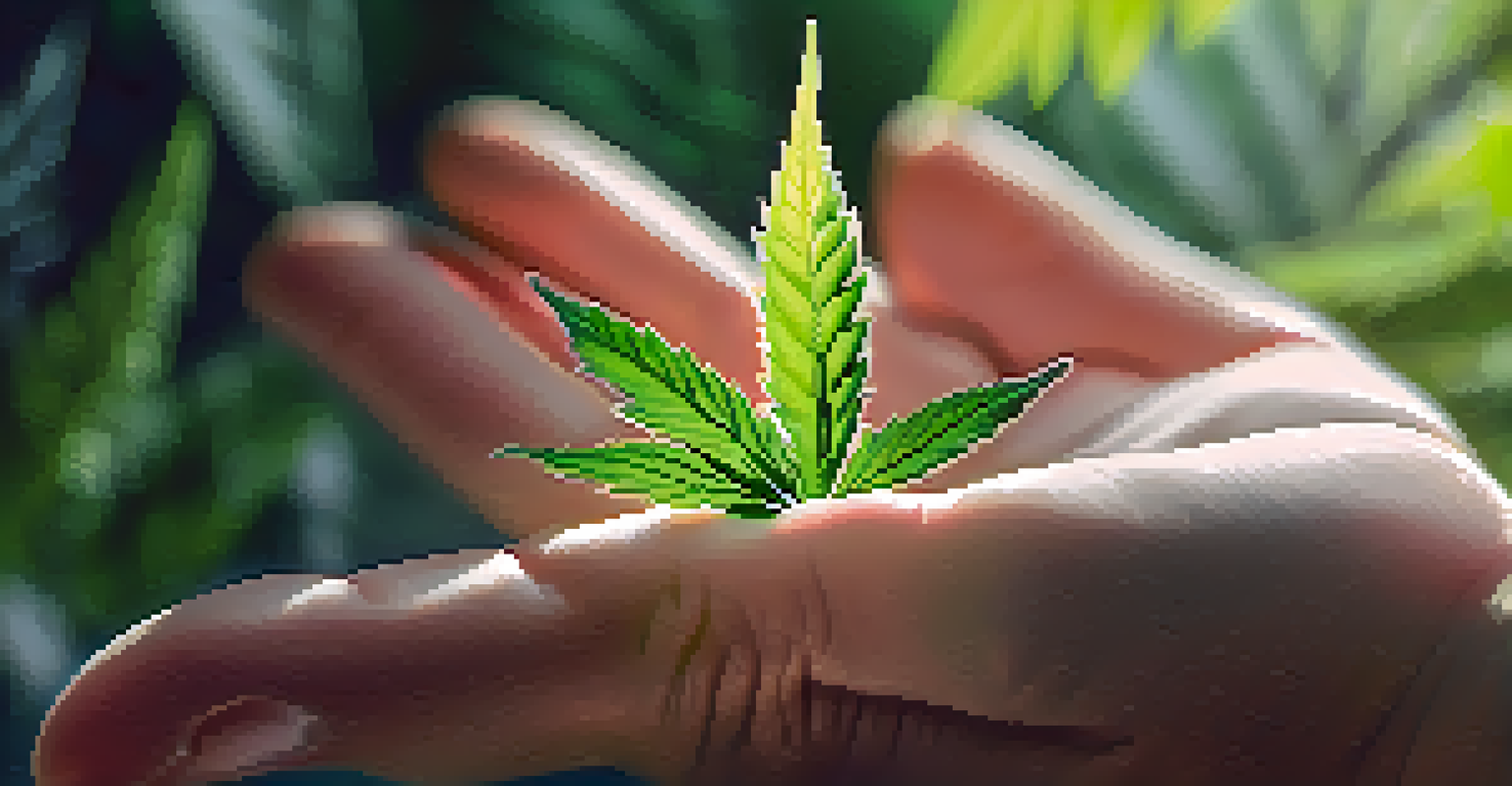The Relationship Between Marijuana Use and Bipolar Disorder Risk

Understanding Bipolar Disorder: A Brief Overview
Bipolar disorder is a mental health condition characterized by extreme mood swings that include emotional highs (mania or hypomania) and lows (depression). These mood shifts can affect sleep, energy, activity, judgment, behavior, and the ability to think clearly. It’s crucial to understand that bipolar disorder is not just about mood; it can significantly impact one’s daily life, relationships, and overall well-being.
The greatest weapon against stress is our ability to choose one thought over another.
While the exact cause of bipolar disorder remains unclear, it’s believed to be a combination of genetics, brain structure, and environmental factors. For example, someone with a family history of the disorder might be at a higher risk. Additionally, stressful life events or substance use can trigger episodes in susceptible individuals, making the interplay between lifestyle choices and mental health even more significant.
Recognizing the symptoms early and seeking appropriate treatment can help manage the disorder effectively. This typically involves a combination of medication, therapy, and lifestyle changes. With the right support, many individuals with bipolar disorder can lead fulfilling lives, but understanding risk factors like substance use is crucial in prevention and management.
The Rise of Marijuana Use in Recent Years
Marijuana use has seen a significant increase, particularly with the rise of legalization efforts across various states in the U.S. Many people are turning to marijuana for its perceived benefits, such as relaxation and pain relief. However, as this trend grows, it’s essential to consider the potential implications for mental health, especially for those who may be vulnerable to conditions like bipolar disorder.

The primary psychoactive compound in marijuana, THC (tetrahydrocannabinol), can produce euphoric effects, which some users find appealing. However, it can also lead to anxiety, paranoia, and even psychotic symptoms in certain individuals. This dual nature of marijuana makes it important for users to be mindful of their mental health history when deciding to use it.
Bipolar Disorder Impacts Daily Life
Bipolar disorder causes extreme mood swings that can significantly affect relationships, behavior, and overall well-being.
As more research emerges, health professionals are increasingly concerned about the long-term effects of regular marijuana use on mental health, particularly concerning mood disorders. Understanding these effects is essential for individuals, especially those who may already be at risk for conditions like bipolar disorder.
Research on Marijuana Use and Bipolar Disorder
Current research on the relationship between marijuana use and bipolar disorder is still evolving, but some studies suggest a complex connection. For instance, some individuals with bipolar disorder may use marijuana to self-medicate during depressive episodes, seeking relief from their symptoms. However, this can lead to a cycle of dependence that complicates their mental health further.
What lies behind us and what lies before us are tiny matters compared to what lies within us.
On the flip side, there’s evidence indicating that regular marijuana use may increase the risk of developing bipolar disorder, particularly in those with a genetic predisposition. This risk appears to be heightened in younger users, highlighting the importance of age and developmental factors in understanding this relationship.
While research is ongoing, it’s clear that marijuana can potentially influence mood and behavior in unpredictable ways, making it crucial for individuals with a history of mood disorders to approach its use with caution. Consulting healthcare professionals for personalized advice can help mitigate risks associated with marijuana use.
The Role of THC and CBD in Bipolar Disorder
Marijuana contains various compounds known as cannabinoids, with THC and CBD (cannabidiol) being the most studied. THC is known for its psychoactive effects, while CBD has gained attention for its potential therapeutic benefits without the high. Understanding the roles of these compounds is vital when discussing marijuana's effects on bipolar disorder.
Some studies suggest that CBD may help alleviate symptoms of anxiety and depression, which could be beneficial for those with bipolar disorder. However, THC’s psychoactive properties can sometimes trigger manic episodes or exacerbate existing symptoms. This contrast highlights the need for more nuanced discussions about cannabis use among individuals with mental health disorders.
Marijuana Use May Complicate Health
Using marijuana can pose risks for individuals with bipolar disorder, potentially triggering manic episodes and complicating treatment.
As research continues, the therapeutic potential of CBD is being explored more thoroughly. Some individuals may find relief through CBD products, but it’s essential to approach any cannabis use cautiously and under the guidance of a healthcare provider, especially for those with bipolar disorder.
Potential Risks of Marijuana Use for Bipolar Patients
For individuals diagnosed with bipolar disorder, marijuana use can pose significant risks. The psychoactive effects of THC can potentially trigger manic or hypomanic episodes, leading to heightened mood states that may result in risky behaviors or poor decision-making. This can further complicate the management of bipolar disorder and the effectiveness of treatment plans.
Additionally, using marijuana as a coping mechanism can quickly escalate into dependency, creating a vicious cycle of mood instability and substance use. This not only impacts mental health but can also affect physical health, relationships, and overall quality of life. Understanding these risks is crucial for individuals who may consider using marijuana.
It’s vital for patients and their support systems to engage in open conversations with healthcare providers about the implications of marijuana use. Developing a comprehensive treatment plan that considers all aspects of a patient’s lifestyle can help mitigate potential risks and promote better mental health outcomes.
Seeking Help: Therapy and Support for Bipolar Disorder
For anyone struggling with bipolar disorder, seeking help is a crucial step towards management and recovery. Therapy, such as cognitive-behavioral therapy (CBT), can be particularly effective in helping individuals understand their condition and develop coping strategies. This approach encourages patients to identify triggers, including substance use, and address them head-on.
Support groups can also provide a sense of community and understanding among individuals facing similar challenges. Sharing experiences with others who understand can be incredibly validating and can help reduce feelings of isolation. Many find comfort in knowing they are not alone in their struggles.
Therapy and Support Are Essential
Engaging in therapy and support groups is crucial for managing bipolar disorder and developing effective coping strategies.
Combining therapy with medication prescribed by a healthcare provider can lead to more effective management of bipolar disorder. It’s essential to approach treatment holistically and consider all factors, including lifestyle choices like marijuana use, to create a balanced and sustainable recovery plan.
Final Thoughts on Marijuana Use and Bipolar Disorder Risk
As the conversation around marijuana use continues to evolve, it’s critical to approach it with a clear understanding of its potential effects, especially concerning bipolar disorder. While some individuals may seek marijuana for relief, it’s essential to weigh the risks and consult with professionals to ensure it doesn’t exacerbate existing mental health issues.
For those with bipolar disorder, making informed choices about substance use can significantly impact their well-being. By staying educated about the implications of marijuana use and seeking support, individuals can navigate their mental health journeys more effectively.

Ultimately, the relationship between marijuana and bipolar disorder is complex and multifaceted. Open dialogue, ongoing research, and personalized treatment plans will be key in helping individuals manage their conditions and make informed decisions about their health.